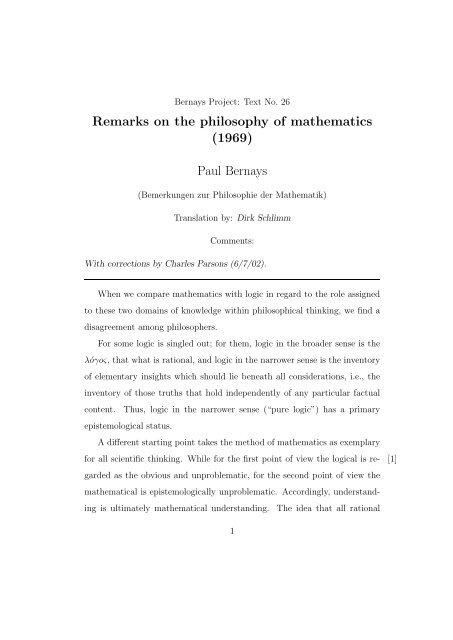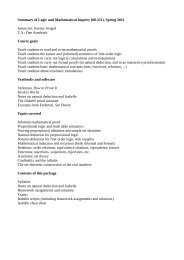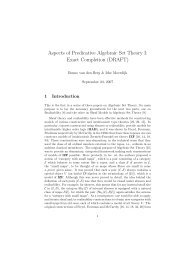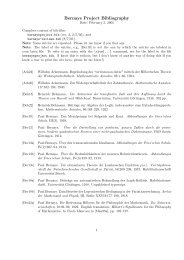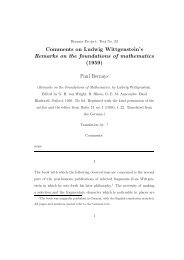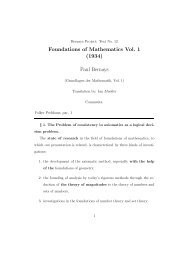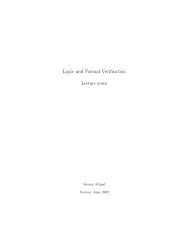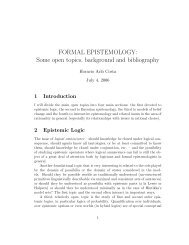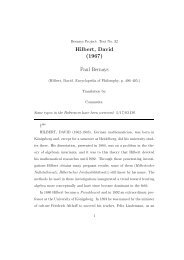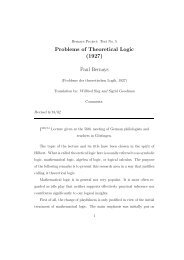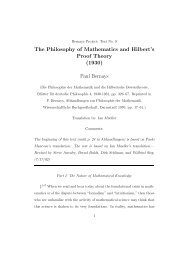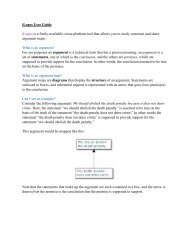Paul Bernays - Phil Cmu
Paul Bernays - Phil Cmu
Paul Bernays - Phil Cmu
You also want an ePaper? Increase the reach of your titles
YUMPU automatically turns print PDFs into web optimized ePapers that Google loves.
<strong>Bernays</strong> Project: Text No. 26<br />
Remarks on the philosophy of mathematics<br />
(1969)<br />
<strong>Paul</strong> <strong>Bernays</strong><br />
(Bemerkungen zur <strong>Phil</strong>osophie der Mathematik)<br />
Translation by: Dirk Schlimm<br />
Comments:<br />
With corrections by Charles Parsons (6/7/02).<br />
When we compare mathematics with logic in regard to the role assigned<br />
to these two domains of knowledge within philosophical thinking, we find a<br />
disagreement among philosophers.<br />
For some logic is singled out; for them, logic in the broader sense is the<br />
λóγoς, that what is rational, and logic in the narrower sense is the inventory<br />
of elementary insights which should lie beneath all considerations, i.e., the<br />
inventory of those truths that hold independently of any particular factual<br />
content. Thus, logic in the narrower sense (“pure logic”) has a primary<br />
epistemological status.<br />
A different starting point takes the method of mathematics as exemplary<br />
for all scientific thinking. While for the first point of view the logical is re- [1]<br />
garded as the obvious and unproblematic, for the second point of view the<br />
mathematical is epistemologically unproblematic. Accordingly, understanding<br />
is ultimately mathematical understanding. The idea that all rational<br />
1
insight must be of a mathematical kind plays a fundamental role particularly<br />
also in the arguments of David Hume.<br />
For this point of view Euclid’s Elements counted for a long time as a<br />
paradigm of the mathematical method. But often it was not sufficiently clear<br />
that from the standpoint of axiomatics the Euclidean axiom system is special<br />
(the fact that early commentators had already come up with suggestions for<br />
replacing axioms by equivalent ones was an indication of this). Obviously<br />
many were of the opinion—although probably not the authors of the Greek<br />
work—that the possibility of a strict and successful proof in geometry is<br />
based on the evidence of the axioms.<br />
Those who philosophized according to the axiomatic method, in particular<br />
in the school of Christian Wolff, at times understood evidence as conceptual<br />
evidence, so that they did not distinguish between the logical and<br />
the mathematical. The principle of contradiction (which mostly included the<br />
principle of excluded middle) was regarded as a magic wand so to speak, from<br />
which all scientific and metaphysical knowledge could be obtained with the<br />
help of suitable concept formations.<br />
As you know, Kant has emphasized in opposition to this philosophy the<br />
moment of the intuitive in mathematics in his theory of pure intuition. But<br />
also for Kant the possibility of geometry as a successful deductive science is [2]<br />
based on the evidence of the axioms, that is in his case, on the intuitive clarity<br />
and certainty of the postulates of existence. That the discovery of non-<br />
Euclidean, Boyai-Lobatschefskian geometry had such a revolutionary effect<br />
on philosophical doctrines is explained by the unclarity in epistemological<br />
judgment about Euclid’s geometry.<br />
2
But a fundamental change of aspect resulted also for the first of the two<br />
mentioned points of view from the development of mathematical logic. It<br />
became clear that logic as a discipline (which it was already with Aristotle)<br />
does not consist directly in establishing singular logical facts, but rather<br />
in investigating the possibilities of proofs in formally delimited domains of<br />
deduction, and should better be called metalogic. Furthermore, the method<br />
of such a metalogic is typically mathematical.<br />
Thus it might seem appropriate to classify logic under mathematics. The<br />
fact that this has mostly not been done is explained by the lack of a satisfactory<br />
epistemological view of mathematics. The term “mathematical” was<br />
not, so to speak, a sufficiently familiar philosophical term. One tried to understand<br />
mathematics itself by classifying it under logic. This is particularly<br />
true of Gottlob Frege. You surely know Frege’s definition of cardinal number<br />
in the framework of his theory of predicates. The method employed here is<br />
still important today for the classification of number theory under set theory. [3]<br />
Various objections (which might be discussed in a group of those interested)<br />
can be raised against the view that hereby an epistemological reduction to<br />
pure logic has been achieved.<br />
A different way of approaching the question of the relation between mathematics<br />
and logic is—as is done in particular by R. Carnap—to regard both<br />
as being analytic. Thereby the Kantian concept of analyticity is fundamentally<br />
extended, which has been pointed out especially by E. W. Beth. For<br />
the most part the same character of obviousness that is ascribed to analytic<br />
sentences in the Kantian sense is attributed to analyticity in this extended<br />
sense.<br />
3
As you know, W. V. Quine has fundamentally opposed the distinction between<br />
the analytic and the synthetic. Although his arguments contain much<br />
that is correct, they do not do justice to the circumstance that by the distinction<br />
between the analytic in the wide sense and the synthetic, a fundamental<br />
distinction is hit upon, namely the distinction between mathematical facts<br />
and facts about natural reality. Just to mention something in this regard:<br />
Mathematical statements are justified in a different sense from statements in<br />
physics. The mathematical magnitudes of analysis are relevant for physics<br />
only approximately. For example, the question whether the speed of light<br />
is measured in the centimeter-second-system by a rational or an irrational<br />
number has hardly any physical sense.<br />
To be sure, the fundamental difference between what is mathematical [4]<br />
and natural reality is not a sufficient reason to equate mathematics with<br />
logic. It appears natural to count as logic only what results from the general<br />
conditions and forms of discourse (concept and judgment). But mathematics<br />
is about possible structures, in particular about idealized structures.<br />
Herewith, on the one hand the methodical importance of logic becomes<br />
apparent, but on the other hand also that its role is in some sense anthropomorphic.<br />
This does not hold in the same way for mathematics, where we<br />
are prompted to transcend the domain of what is surveyable in intuition in<br />
various directions. The importance of mathematics for science results already<br />
from the fact that we are concerned with structures in all areas of<br />
research (structures in society, structures in the economy, structure of the<br />
earth, structures of plants, of processes of life, etc.). The methodical importance<br />
of mathematics is also due to the fact that a kind of idealization [5]<br />
4
of objects is applied in most sciences, in particular the theoretical ones. In<br />
this sense F. Gonseth speaks of the schematic character of the scientific description.<br />
What differentiates the theoretically exact from the concrete is<br />
emphasized especially also by Stephan Körner. As you know, science has<br />
succeeded in understanding the connections in nature largely structurally,<br />
and the applicability of mathematics to the characterization and explanation<br />
of the processes in nature reaches much further than humanity had once<br />
anticipated.<br />
But the success and scope of mathematics is something entirely different<br />
from its so-called obviousness. The concept of obviousness is philosophically<br />
questionable in general. We can speak of something being relatively obvious<br />
in the sense in which, for example, the mathematical facts are obvious for the<br />
physicist, the physical laws for the geologist, and the general psychological<br />
properties of man for the historian. It may be clearer to speak here of the<br />
procedurally prior (according to Gonseth’s expression “préalable”) instead<br />
of the obvious.<br />
At all events mathematics is not obvious in the sense that it has no problems,<br />
or at least no fundamental problems. But consider for instance, that<br />
there was no clear method for analysis for a long time despite its great formal<br />
success, but the researchers had to rely more or less upon their instinct.<br />
Only in the 19th century precise and clear methods have been achieved here.<br />
Considered from a philosophical point of view the theory of the continuum of<br />
Dedekind and Cantor, which brought the justifications of these methods to an<br />
end, is not at all simple. It is not a matter of the bringing to consciousness of<br />
an apriori cognition. One might rather say that here a compromise between<br />
5
the intuitive and the demands of precise concepts has been achieved which<br />
succeeded very well. You also know that not all mathematicians agree with<br />
this theory of the continuum and that the Brouwerian Intuitionism advocates<br />
a different description of the continuum—of which one can surely find that<br />
it overemphasizes the viewpoint of strict arithmetization at the expense of<br />
the geometrically satisfying.<br />
The problems connected with the antinomies of set theory are especially<br />
well known and often discussed. As you know, different suggestions have<br />
been brought forward to repair the antinomies. In particular, axiomatic<br />
set theory should be mentioned, which shows that such a small restriction<br />
of the set theoretic procedure suffices to avoid the antinomies that all of<br />
Cantor’s proofs can be maintained. Zermelo’s original axiom system for set<br />
theory has been, as you surely know, on the one hand extended, on the other<br />
hand made formally sharper. The procedure of solving the antinomies using<br />
axiomatic set theory can be interpreted philosophically as meaning that the<br />
antinomies are taken as an indication that mathematics as a whole is not a<br />
mathematical object and therefore mathematics can only be understood as<br />
an open manifold.<br />
The application of the methods of making formally precise to set theory<br />
resulted in a split of the set theoretic considerations into the formulation and<br />
deductive development of formal systems, and a model theory. As a result<br />
of this split the semantic paradoxes, which could be disregarded at first for<br />
the resolution of the purely set theoretic paradoxes, received new formulation<br />
and importance. So today we face a new set of fundamental problems, which,<br />
to be sure, does not bother mathematics in its proper research, just as the<br />
6
set-theoretic antinomies did not earlier. Rather, [mathematics] unfolds in<br />
the different disciplines with great success.<br />
The above remarks suggest the following viewpoints for philosophy of<br />
mathematics, which are also relevant for epistemology in general:<br />
1. It appears appropriate to ascribe to mathematics factual content,<br />
which is different from that of natural reality. That other kinds of objectivity<br />
are possible than the objectivity of natural reality is already obvious<br />
from the objectivity in the phenomenological regions. Mathematics is not<br />
phenomenological insofar, as has been said before, it is about idealized structures<br />
on the one hand, and on the other hand it is governed by the method<br />
of deduction. With idealization, intuitiveness comes into contact with conceptualization.<br />
(Therefore, it is not appropriate to oppose intuitiveness and<br />
conceptualization so heavily as it is done in Kantian philosophy).<br />
The significance of mathematics for theoretical physics consists in the<br />
fact that therein the processes of nature are represented approximatively by<br />
mathematical entities.<br />
2. It does not follow from the difference between mathematics and empirical<br />
research that we have knowledge in mathematics that is secured at<br />
the outset (apriori). It seems necessary to concede that we also have to learn<br />
in the fields of mathematics and that we here, too, have an experience sui<br />
generis (we might call it “intellectual experience”). This does not diminish<br />
the rationality of mathematics. Rather, the assumption that rationality is<br />
necessarily connected with certainty appears to be a prejudice. We almost<br />
nowhere have certain knowledge in the simple, full sense. This is the old Socratic<br />
insight which is emphasized today especially also in the philosophies<br />
7
of F. Gonseth and K. Popper.<br />
We have certainly to admit that in mathematical considerations, in particular<br />
in those of elementary mathematics, we possess a particular kind of<br />
security, because on the one hand the objects are intuitively clear and, on the<br />
other hand, almost everything is stripped off by the idealization of the objects<br />
that could lead to subjectivity.—But when we talk about the certainty<br />
of 2∗2 = 4 in the popular sense, we think at the concrete applications of this<br />
statement. But the application of arithmetical statements to the concrete<br />
is based on empirical conditions, and for their compliance we only have an<br />
empirical, even if practically sufficient certainty.<br />
By dropping the coupling of rationality and certainty we gain, among<br />
other things, the possibility to appreciate the heuristic rationality, which<br />
plays an essential role for scientific inquiry.<br />
The acknowledgment of heuristic rationality provides in particular the<br />
solution to the epistemological difficulty that has been made a problem by<br />
David Hume: we can acknowledge the rational character of the assumption<br />
of necessary connections in nature, without having to claim that the basic<br />
approach of [assuming] such connections guarantees success; with regard to<br />
this success we depend in fact on experience.<br />
8


